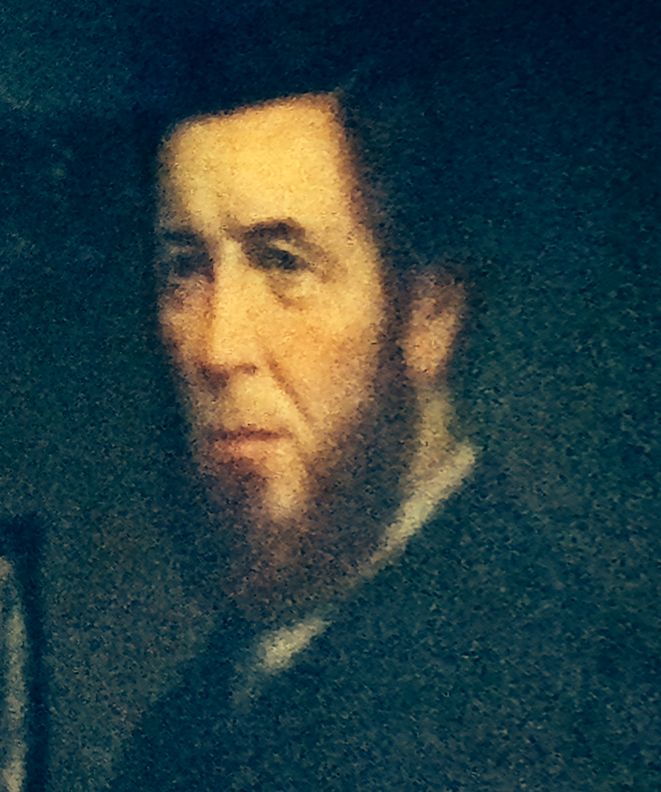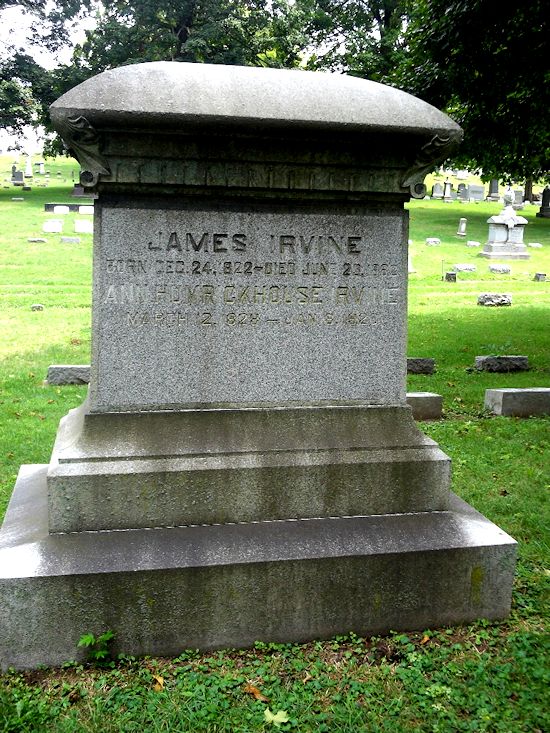| Previous Soldier's Profile | Soldier's Profile Home Page | 16th OVI Home Page | Next Soldier's Profile |
James S. Irvine
Colonel, Field and Staff (90-day)

painting at the Johnson-Humrickhouse Museum, Coshocton, Ohio
pending permission from Brad Foster, FindAGrave.com
| Personal | |||||||||
|---|---|---|---|---|---|---|---|---|---|
| born: | December 24, 1822 | place: | Wooster, Ohio | ||||||
| father: | Samuel | born: | June 22, 1788 | place: | Derge Bridge,Tyrone,Ireland | died: | April 28, 1861 | place: | Fredericksburg, Ohio |
| mother: | Maria Glasgow | born: | 1798 | place: | Beaver City, Pennsylvania | died: | April 8, 1871 | place: | Fredericksburg, Ohio |
| pre-war occupation: | school teacher | place: | Coshocton, Ohio | pre-war occupation: | mayor, Coshocton, Ohio, 1852 | place: | Coshocton, Ohio | ||
| post-war occupation: | lawyer; prosecuting attorney | place: | Coshocton County, Ohio | ||||||
| married: | June 26, 1852 | to: | Anna Isabella Humrickhouse | place: | |||||
| wife born: | March 12, 1828 | place: | Pennsylvania | died: | January 8, 1920 | place: | Coshocton, Ohio | ||
| child: | Sarah | born: | October 18, 1855 | place: | Ohio | died: | October 17, 1904 | place: | |
| child: | Samuel | born: | October 23, 1857 | place: | Coshocton, Ohio | died: | July 13, 1919 | place: | Pittsburg, Pennsylvania |
| child: | Mary | born: | October 12, 1861 | place: | Ohio | died: | place: | ||
| died: | June 23, 1882 | place: | Coshocton, Ohio | cause of death: | |||||
| burial: | Oak Ridge Cemetery | place: | Coshocton, Ohio |
| Military Career | |||||
|---|---|---|---|---|---|
| Mexican War: | May, 1847 | 2nd Lieutenant | Company G, 4th OVI | place: | |
| appointed: | September, 1847 | Captain | Company G, 4th OVI | ||
| discharged: | 1848 | Captain | Company G, 4th OVI | place: | |
| Civil War - 90-day service: | May 3, 1861 | Colonel | 16th Ohio Volunteer Infantry | place: | |
| discharged: | August 18, 1861 | mustered out with regiment | place: | ||
| commissioned: | December 2, 1863 | Captain | Company M, 9th Ohio Cavalry (raised and commanded) | place: | |
| promoted: | May 31, 1865 | Major | Field and Staff, 9th Ohio Cavalry | ||
| discharged: | August 2, 1865 | place: | |||
Additional Details
Details researched by this website
From History of Coshocton County, Ohio: Its Past and Present, 1740 - 1881
IRVINE J., Coshocton; attorney at law; was born December 24, 1822, at Wooster, Ohio, where he remained until he was ten years old, when with his parents, he went to Fredericksburgh, where on finishing his education he began teaching school. He taught in Ashland county, and also in the schools at Fredericksburg. At the age of twenty-four he entered as a student the law office of Sapp & Wilker, and was admitted to practice about the time war was declared between the United States and Mexico. In May, 1847, he enlisted in Company G, [9th] O.V.I. as second lieutenant, and in September of the same year he was elected captain of the company at Matamoras, Mexico, and was honorably discharged in 1848 at Cincinnati, Ohio. On receiving his discharge he came to his present location, and taught school one year; then resumed his present law profession. In April, 1861, he enlisted as colonel of the Sixteenth O.V.I. and served three months. In 1863 he recruited company M, Ninth O.V.C., and was commissioned its captain, and subsequently major, and served until August 2, 1865. In June, 1853, Col. Irvine was married to Miss Annie Humrickhouse. They became the parents of two children, Samuel and Mary.
From Centennial History of Coshocton County, Ohio Volume 1 - details on Irvine's Mexican War experience
[Regarding Company G, 4th Ohio Volunteer Infantry, 1847/1848] These troops did garrison duty at Matamoras [Mexico] until ordered in September to Vera Cruz which had surrendered to Scott earlier in the year. At this point the Fourth Ohio was assigned to General Joe Lane's brigade in the division under command of General Robert Patterson. On the march to the City of Mexico the Coshocton volunteers went through the "baptism of fire" at the National Bridge. They came upon Major Lally and his plucky four hundred holding the position against Mexican thousands. The Fourth Ohio, as advance guard, went to the major's assistance. When the Mexicans were driven back it was found that Coshocton boys had been severely wounded.
In an engagement at Huamantla the Fourth Ohio had charge of prisoners, much to the relief of Iturbide. The son of the Mexican emperor, when brought with a troop of prisoners to the rear guard, asked Captain Irvine what troops guarded the prisoners. He looked his gratitude when he learned who they were and that he was safe from the vengeance of the Texas rangers whose gallant, daredevil leader, the famous Captain Walker, had fallen that day.
Continuing the march, General Lane's brigade consigned superfluous baggage to flames at Jalapa, and by forced march hurried to Pueblo, arriving at the crucial moment to rescue from Mexican vengeance eighteen hundred sick and wounded American military soldiers lying in Pueblo hospitals. These had become the object of Santa Ana's hatred in the maddening hour when one after another of Mexico's strongholds had fallen -- when in a few minutes six thousand Mexicans were routed from the Contreras gateway to the capital city -- when San Antonio fell -- when the citadel of Chapultepec itself was carried by storm and the conquering forces swept into the city. No Mexicans could stand before the tumultuous onslaught of the Americans rushing upon batteries and breastworks, and hacking their way through in hand to hand fighting, swinging rifles like clubs and mowing down resistance with bayonet and sword. Santa Ana fled in the night and with a force stole upon the Pueblo hospitals to wreak vengeance.
It was then that Lane's troops with the Coshocton boys among them hurled themselves upon Santa Ana. The brigade was in three attacking columns, one headed by the Fourth Ohio. Up the streets of Pueblo they fought their way, driving back the Mexicans who made their last stand in the plaza, the public square in the heart of the town.
The firing, the clashing o f swords, the cursing, the groans of the wounded and dying reached the sickbeds in the hospitals where hearts beat high with fever of anxiety. In the plaza, men flung themselves panting against the walls; some toppled over the shrubbery at the fountain, and the water reddened. Santa Ana's force was finally overcome. The struggle left Coshocton boys in the hospitals. When the Fourth Ohio finally marched from Pueblo it was to return home.
Various historical records indicate James Irvine was the third mayor of Coshocton, Ohio, in 1852 and 1853.

image courtesy of and with permission from Debe Clark, FindAGrave.com
| Previous Soldier's Profile | Soldier's Profile Home Page | 16th OVI Home Page | Next Soldier's Profile |